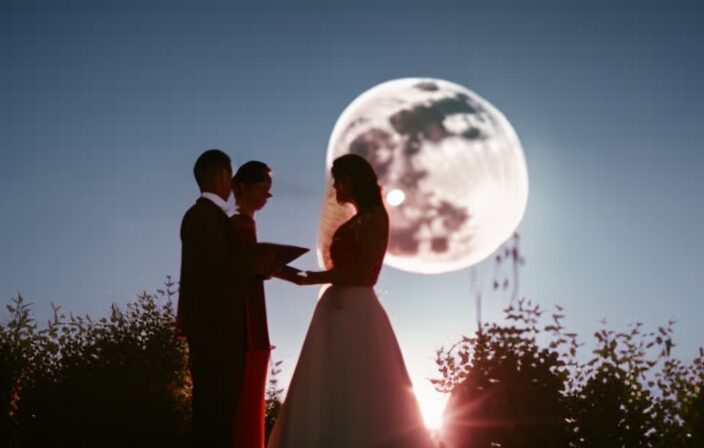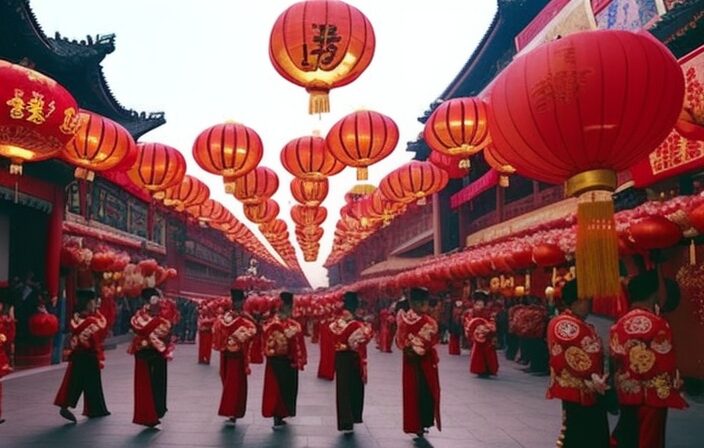In the realm of romance and matrimony, the celestial guidance of the lunar calendar has long held a cherished place. From ancient times to modern-day weddings, its influence on matchmaking and marital bliss is undeniable.
This article delves into the historical significance of the lunar calendar in facilitating harmonious unions, exploring cultural beliefs, auspicious dates, and astrological compatibility.
We also examine the captivating rituals and ceremonies that honor this timeless cosmic guide, as well as modern adaptations in contemporary weddings.
Join us on a journey where love and the lunar calendar intertwine seamlessly.
Key Takeaways
- The lunar calendar has a profound influence on cultural practices and traditions, particularly in the areas of matchmaking and weddings.
- Compatibility in relationships is often assessed based on birth dates and the lunar calendar provides insights into personalities, characteristics, and potential conflicts.
- Superstitions and traditions heavily influence the compatibility of couples and the selection of auspicious dates for weddings.
- Lunar date selection plays a significant role in wedding celebrations, ensuring an auspicious wedding date and considering positive lunar energies for good luck.
Historical Significance of the Lunar Calendar in Matchmaking and Weddings
The historical significance of the lunar calendar in matchmaking and weddings is evident in the profound influence it has had on cultural practices and traditions across various societies.
Lunar calendar matchmaking rituals and wedding customs have been an integral part of many civilizations for centuries.
In many traditional societies, the lunar calendar played a crucial role in determining the most auspicious dates for matchmaking. Astrologers and fortune tellers would consult the lunar calendar to identify favorable days for couples to meet, get engaged, or even tie the knot. This belief in the influence of the lunar calendar on relationships stems from the notion that the alignment of celestial bodies can affect human emotions and compatibility.
Furthermore, lunar calendar wedding customs have shaped the way weddings are celebrated in different cultures. Many Asian countries, for example, follow lunar calendar-based traditions during wedding ceremonies. These customs often include specific rituals and practices that are believed to bring good luck and blessings to the newlyweds.
From ancient China to modern-day Korea, the lunar calendar has played a pivotal role in matchmaking and weddings. Its historical significance is deeply rooted in cultural traditions, reflecting the belief in the power of celestial forces to guide and influence human relationships.
The influence of the lunar calendar on matchmaking and weddings is a testament to the enduring connection between astrology, culture, and love.
Cultural Beliefs and Practices Associated With Lunar Calendar Matchmaking
Cultural beliefs and practices associated with lunar calendar matchmaking are deeply rooted in tradition and superstition. Many cultures believe that the compatibility of two individuals can be determined by their respective lunar calendar signs.
Superstitions and traditions surrounding lunar calendar matchmaking often dictate the selection of auspicious dates for marriage ceremonies, ensuring a harmonious and prosperous union.
Lunar Calendar Compatibility
One important aspect of lunar calendar matchmaking is assessing the compatibility between two individuals based on their respective birth dates. Lunar calendar predictions play a significant role in determining the compatibility of a couple, as it provides insights into their personalities, characteristics, and potential conflicts.
Lunar calendar matchmaking techniques involve analyzing the birth years, months, and even the specific hour of birth to determine the compatibility between two individuals. This method takes into account the zodiac signs and elements associated with each person’s birthdate, as well as the interaction between these signs.
Superstitions and Traditions
Superstitions and traditions play a significant role in shaping the beliefs and practices surrounding marriage and relationships. In the context of lunar matchmaking, there are several superstitions that are believed to influence the compatibility of couples. According to Chinese folklore, the lunar calendar is used to determine auspicious dates for weddings, as certain lunar phases are believed to bring good fortune and blessings to the couple’s union.
Additionally, there are various traditional wedding rituals that are deeply rooted in cultural beliefs and customs. These rituals often symbolize unity, prosperity, and fertility, and are performed to ensure a harmonious and successful marriage. From the exchange of wedding vows to the arrangement of the bridal chamber, each ritual holds deep significance and is believed to bring happiness and longevity to the couple’s relationship.
Marriage Auspicious Dates
In the context of marriage, selecting auspicious dates is an important consideration for many couples. This practice is rooted in marriage customs and traditional beliefs, where the alignment of celestial bodies is believed to influence the success and longevity of the union.
When choosing an auspicious date, couples often consult the lunar calendar, which plays a significant role in matchmaking and weddings. Here are four key factors that are taken into account when selecting an auspicious date:
-
Lunar Phases: The phase of the moon is believed to impact the energy and harmony of the marriage. Full moons are considered auspicious, symbolizing abundance and prosperity.
-
Zodiac Signs: The zodiac sign associated with the wedding date is carefully considered. Each sign has its own attributes and compatibility, and couples aim to choose a sign that complements their own.
-
Five Elements: The five elements of wood, fire, earth, metal, and water are also taken into account. Balancing these elements is believed to bring harmony and good luck to the marriage.
-
Clash and Affinity: The compatibility between the couple’s Chinese zodiac signs is analyzed to ensure there are no clashes that may bring negative energy to the marriage. Affinity between the signs is sought after, as it signifies a harmonious and prosperous union.
Determining Auspicious Dates: How the Lunar Calendar Guides Wedding Planning
The lunar calendar plays a significant role in guiding wedding planning by helping determine auspicious dates for couples to tie the knot. This ancient calendar system, rooted in the historical significance of the lunar cycle, has been deeply ingrained in various cultures around the world for centuries. Originally developed to assist in agricultural planning, the lunar calendar was used to track the seasons and predict the best times for planting and harvesting. However, its influence expanded beyond agriculture to include cultural festivals and celebrations, including weddings.
In many cultures, the lunar calendar is closely linked to religious and spiritual beliefs. It is believed that certain dates align with favorable cosmic energies, ensuring a harmonious and prosperous start to the couple’s married life. The lunar calendar also takes into account the positions of the moon, sun, and other celestial bodies, which are believed to have an impact on human emotions and relationships.
Wedding planning based on the lunar calendar involves careful consideration of specific dates and times. Couples consult astrologers or experts who analyze the alignment of celestial bodies and provide recommendations for auspicious dates. These experts take into account factors such as the positions of the moon and stars, as well as the couple’s birth charts, to determine the most favorable times for the wedding ceremony.
Incorporating the lunar calendar into wedding planning not only adds a touch of tradition and cultural significance but also provides a sense of harmony and well-being. It allows couples to start their married life on a positive note, surrounded by the blessings of the universe.
Astrological Compatibility: Matching Love and the Lunar Calendar
Astrological compatibility is an important consideration for couples looking to align their love life with the cosmic energies and auspicious dates suggested by astrologers. When it comes to astrological matchmaking and lunar wedding rituals, there are several key factors to consider:
-
Sun Sign Compatibility: The zodiac sign under which a person is born can provide insights into their personality traits and compatibility with other signs. Astrologers analyze the compatibility between sun signs to determine the harmony or challenges that may arise in a relationship.
-
Moon Sign Compatibility: The moon sign represents our emotions and innermost desires. Matching moon signs can ensure emotional compatibility and a deeper understanding between partners.
-
Venus and Mars: Venus represents love and romance, while Mars represents passion and desire. The alignment of these planets in the birth charts of both partners can indicate the level of attraction and sexual compatibility.
-
Aspects and Synastry: Astrologers consider the aspects between the planets in each partner’s birth chart to determine the overall compatibility. The synastry analysis examines how the planets interact with each other, providing insights into the strengths and potential challenges in a relationship.
Lunar Calendar Rituals and Ceremonies in Wedding Celebrations
In traditional cultures, the lunar calendar plays a significant role in wedding celebrations. Various rituals and ceremonies are conducted to ensure a successful and harmonious union. Lunar date selection is often practiced, where couples consult a lunar calendar to determine the most auspicious date for their wedding.
Symbolic lunar traditions are also incorporated into the ceremonies. This can include the worship of the moon goddess or the inclusion of moon-shaped decorations and motifs.
These cultural practices demonstrate the importance of the lunar calendar in traditional wedding celebrations. They not only bring blessings and good luck to the couple, but also connect them to their cultural heritage and traditions.
Lunar Date Selection
Lunar date selection plays a significant role in determining auspicious dates for weddings and matchmaking in certain cultural traditions. The lunar calendar, with its deep-rooted history and connection to celestial movements, is believed to hold the key to predicting favorable days for these important life events.
Here are four reasons why lunar date selection is considered crucial in matchmaking and weddings:
-
Alignment with Lunar Energies: The lunar calendar is believed to influence the energy flow of individuals, and selecting dates that align with positive lunar energies is thought to bring good luck and harmony to the couple.
-
Traditional Beliefs: Many cultures have long-standing beliefs that certain lunar phases or zodiac signs are more conducive to successful marriages and relationships. Following these traditions ensures adherence to cultural customs and beliefs.
-
Astrological Significance: The positioning of celestial bodies during specific lunar dates is considered important in astrological practices. Matching astrological signs and aligning them with auspicious dates is believed to enhance compatibility and marital bliss.
-
Practical Considerations: Lunar date selection also takes into account practical considerations like weather, availability of resources, and cultural festivals, ensuring a smooth and enjoyable wedding experience.
Symbolic Lunar Traditions
Symbolic lunar traditions hold deep cultural significance and are woven into the fabric of many societies, influencing various aspects of life beyond matchmaking and weddings.
The moon has long been associated with mystical and spiritual meanings, and its phases and movements are often interpreted symbolically. Different cultures have their own unique interpretations of lunar symbolism. In Chinese culture, for example, the full moon represents abundance and prosperity, while the new moon symbolizes new beginnings.
These symbolic interpretations are not limited to cultural traditions, but also extend to astrological predictions. Astrologers often use the moon’s position and phase to make predictions about a person’s personality traits, emotions, and even compatibility with others.
The lunar calendar, therefore, serves as a guide for many people to navigate their lives and make important decisions based on these symbolic interpretations and astrological predictions.
The Lunar Calendar’s Influence on Marriage and Relationship Success
The influence of the lunar calendar on marriage and relationship success is a topic of great interest and investigation among scholars and practitioners in the field of astrology and relationship counseling. The lunar calendar, with its varying phases and cycles, is believed to have a significant impact on love compatibility and relationship longevity.
Here are four key ways in which the lunar calendar influences marriage and relationship success:
-
Love Compatibility: The lunar calendar provides insights into the compatibility between two individuals based on their zodiac signs and the lunar phase at the time of their birth. It helps determine how well they complement each other and can enhance their understanding and harmony in a relationship.
-
Emotional Connection: The lunar calendar’s cycles affect our emotions and moods. By aligning romantic activities, such as proposals or weddings, with positive lunar phases, couples can strengthen their emotional connection and create a solid foundation for their relationship.
-
Fertility and Family Planning: The lunar calendar is also used to determine the most auspicious times for conception and childbirth. Couples can consult the lunar calendar to ensure the highest chances of fertility and a healthy pregnancy, leading to a happier and more fulfilling family life.
-
Relationship Longevity: The lunar calendar’s impact on marriage and relationship success extends beyond the initial stages. Couples can use the lunar calendar to plan special dates and celebrations, reinforcing their bond and promoting long-term happiness and longevity in their relationship.
Modern Adaptations: Incorporating the Lunar Calendar Into Contemporary Weddings
Incorporating the cycles and phases of the moon into contemporary wedding ceremonies has become a popular trend among couples seeking to add a touch of mysticism and spirituality to their special day. Modern adaptations have taken the traditional concept of the lunar calendar and transformed it into a unique and personalized experience for couples.
One way couples are incorporating the lunar calendar is by selecting a wedding date based on the moon’s phase. The different phases of the moon symbolize different aspects of love and relationships, and couples often choose a phase that aligns with their intentions for their marriage. For example, a waxing moon is associated with growth and new beginnings, making it an ideal choice for couples looking to start their journey together. On the other hand, a full moon represents abundance and fertility, which may appeal to couples hoping to start a family.
Another modern adaptation is the inclusion of moon-inspired decorations and rituals during the wedding ceremony. Couples may choose to have an altar adorned with moon-themed decorations, such as crescent-shaped arches or moon-shaped lanterns. They may also incorporate rituals that involve the moon, such as a moon gazing ceremony where the couple looks at the moon together and makes wishes for their future.
Incorporating the lunar calendar into contemporary weddings allows couples to infuse their special day with a sense of spirituality and connection to nature. Whether it’s selecting a wedding date based on the moon’s phase or incorporating moon-inspired decorations and rituals, these modern adaptations add a unique and meaningful touch to the wedding ceremony.
Conclusion
In conclusion, the lunar calendar has played a significant role in matchmaking and weddings throughout history. Its cultural beliefs and practices have guided the determination of auspicious dates and influenced astrological compatibility.
Lunar calendar rituals and ceremonies have been incorporated into wedding celebrations, contributing to marriage and relationship success. Even in modern times, the lunar calendar continues to be adapted and integrated into contemporary weddings.
Like the moon’s phases, the lunar calendar acts as a guiding light, ensuring harmony and happiness in marital unions.



